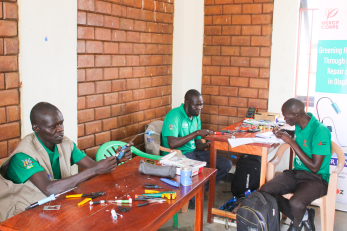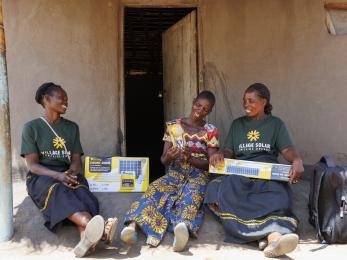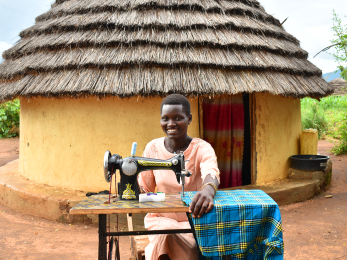Scaling Sustainable Community led Models for E-waste Management in Displacement Settings

In 2022, Mercy Corps, in partnership with the International Organization for Migration (IOM) and supported by Innovation Norway, launched a groundbreaking pilot project focused on addressing the growing issue of e-waste in refugee settlements. The "Greening Humanitarian Responses through Recovery, Repair, and Recycling of Solar Products in Displacement Settings" pilot aimed to tackle the environmental and health risks posed by improperly disposed solar products and accessories, while simultaneously promoting environmental protection, sustainable energy access, and local employment opportunities.
Building on the pilot's success, Mercy Corps and IOM implemented the E-Waste Circular Economy Scale: Exploring Synergies and Insights Transition-To-Scale Project in Bidibidi Refugee Settlement and the host community in Yumbe District, Uganda. The project was focused on proving a self-sustaining, financially viable circular economy model for e-waste management that can be replicated in other displacement settings.
The Bidibidi Refugee Settlement, home to over 270,000 refugees, predominantly from South Sudan, is off the national electricity grid, making solar lanterns and off-grid solar products the primary energy source. However, without a proper disposal system, the accumulation of e-waste poses significant health and environmental risks. This project focused on creating scalable solutions for managing this e-waste while providing economic opportunities for the community.
Key outcomes of the project include:
- Establishing a self-sustaining financial model with sufficient e-waste volume to ensure economies of scale.
- Understanding the local ecosystem and integrating it into the e-waste circular economy solution.
- Testing flexible management models that can be adapted to various locations.
The project successfully registered a community-led E-Waste cooperative in Bidibidi, reached over 110,920 community members with e-waste awareness campaigns, and facilitated the collection and repair of solar lanterns. The project has also established satellite repair hubs and introduced mobile e-waste collection and repair services to improve accessibility. Over a short period, these activities have generated $625.60 in revenue for the community.
This learning brief captures the valuable lessons learned from the project, offering recommendations and insights that can guide the scaling and replication of similar solutions in other displacement settings.


